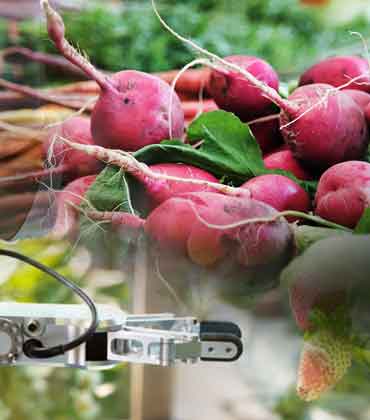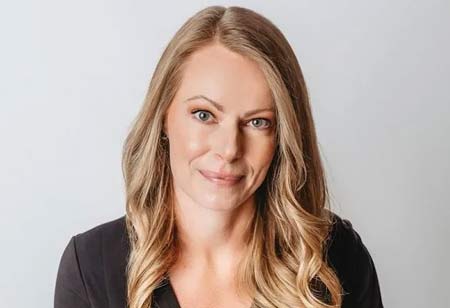THANK YOU FOR SUBSCRIBING
By Kristen Thompson, SVP, Business Unit President - Frozen & Vegetables, B&G Foods
The Pursuit of Excellence: Evaluating the Palatability of...
By Tanja Dinic, Director Of Internal Audit For Food Safety, Fortenova
How Can Sustainable Food Affect Food Fraud?
By Enrique Leon, AI Enterprise Architect, American Sugar Refining Inc
Enhanced Precision Agriculture using Cloud Based AI

Strategies for Success in the Ever-Changing Food Industry
Aimee Roy, Director of National Distributors, Stonewall Kitchen Family of Brands

 Aimee Roy, Director of National Distributors, Stonewall Kitchen Family of Brands
Aimee Roy, Director of National Distributors, Stonewall Kitchen Family of BrandsAimee is an experienced regional sales manager with a proven track record in the food production industry. She possesses strong sales skills and expertise in operations management, customer service, retail, sales, and distribution center operations.
Please tell us about the journey that you've had so far and your roles and responsibilities at Stonewall Kitchen Family of Brands.
Stonewall Kitchen began as two guys making kitchen goods and selling them at a local farmer's market to earn extra money. Over time, the company expanded with various opportunities. I joined in 1998 when it was still a small business with around 15 to 20 products. Today, we offer over 5,000 different items.
I've been with Stonewall Kitchen for 25 years, with a diverse career spanning sales and distribution management. I currently work with UNFI and KeHE, which are our largest companies for distribution. I also manage inventory to ensure timely deliveries to customers at UNFI and KeHE and manage promotional activities. I also collaborate on marketing programs both directly with customers and through UNFI and KeHE to effectively market our products to their customers.
What are some of the major challenges in the food industry?
One of the major challenges faced is the significant cost of doing business with larger companies like KeHE and UNFI. This cost is necessary to secure valuable shelf space for our products. However, it adds to the overall marketing expenses required to reach the end customer. These additional fees and complexities make it challenging to maintain a profitable business with some of these larger companies. The key is to carefully manage and allocate spending, fully comprehending the charges involved, such as slotting, spoils, TPRS, and shelf tags, to sustain a successful and profitable relationship with each customer.
What are recent trends that have evolved to help tackle these pain points?
There are numerous companies offering audit services for various aspects of business operations, from scrutinizing freight and additional charges to managing chargebacks like spoilage fees. In the past, tracking these expenses was easy, but current market intricacies often necessitate outside expertise to identify and ensure the accuracy of these charges. This helps in ensuring that these expenses align with contractual agreements and potentially renegotiating fees if necessary. Therefore, it's of utmost importance to have a clear comprehension of the charges being applied and ensuring their accuracy.
Is there a project initiative that you've been part of recently and have implemented one or a couple of these trends to make that successful?
We deal with a variety of commodities, maintain a high-end product line, and use IQF fruit. However, with the impact of climate change, the costs of these ingredients have risen. Therefore, it's crucial to have a clear understanding of our future requirements.
"Acquiring extensive knowledge about your industry and organization is the key to making informed decisions and effectively communicating with customers. It is crucial to have a comprehensive understanding of all the components involved in order to anticipate potential issues and proactively find solutions before they arise"
We've also engaged in product redevelopment due to challenges like the unavailability of our preferred berry variety. In response to market fluctuations driven by weather and geopolitical factors, we've had to adapt and explore another berry or group of strawberries that provide similar flavor and texture. We've also focused on cost-saving measures, such as sourcing from different suppliers, ordering in larger quantities for better pricing, and securing commodities in advance. In addition, we've streamlined our processes to reduce overhead costs.
Precision in forecasting has become essential to prevent overstocking and ensure that we maintain the right inventory levels. These times of uncertainty require diligent financial management and inventory control to keep costs in check and products readily available. Also, we've had to adjust formulations and even update labels when key ingredients become unavailable, adding complexity to our operations.
How do you see the food industry evolve over the next few years?
Currently, individuals seem to be quite vigilant about their spending habits, particularly due to the significant increase in food prices over the past year. Consequently, I anticipate that people will continue to prioritize fiscal responsibility. This also applies to manufacturers like us, who are also closely monitoring our financial performance.
We are increasing our promotional budget and potentially exceeding our usual spending to ensure that customers continue purchasing our product and perceive it as a valuable purchase.
It is important for individuals to make adjustments and allow for some flexibility in their business, even if it means sacrificing a small portion of their profit temporarily. This adaptability is crucial in ensuring stability within the next 24 months, while global conflicts and domestic political situations progress and determine the future direction for everyone involved.
Any specific piece of advice that you'd like to share with your fellow peers or other industry leaders?
My guidance would be to acquire extensive knowledge about not just the industry you are employed in, but also about the organization you are working for. Even if you work in sales, it is essential to understand the impact of marketing, the operations at the distribution center, and their significance. For instance, delays in deliveries might occur due to obstacles faced by truckers who are becoming less interested in driving trucks.
It is crucial to have a comprehensive understanding of all the components involved to make informed decisions and effectively communicate with customers. This can anticipate potential issues and proactively find solutions to address them before they arise.
Maintaining effective communication among your team members and customers is also crucial. Often, individuals simply desire to be aware of ongoing developments and improvements, even if they are not flawless. Therefore, it is important to keep them informed about the current situation and our efforts to enhance it.
Read Also















